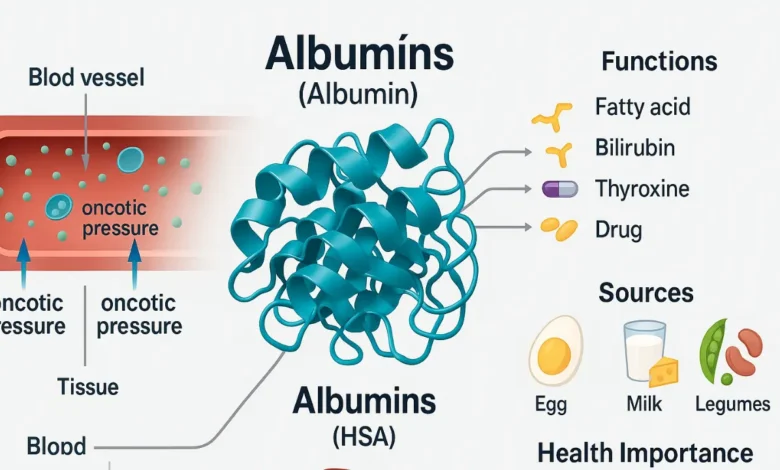Albumīns: Structure, Functions, Sources, and Health Importance

Albumīns is one of the most abundant and essential proteins in the human body. Found primarily in blood plasma, it plays a critical role in regulating overall health, fluid balance, and transporting essential molecules. The albumīns is commonly used in Latvian to refer to albumin, a protein that is not only present in humans but also in many animals and even plants. Its functions are diverse, making it one of the most studied proteins in medical science, nutrition, and biochemistry.
What is Albumīns?
Albumīns is a water-soluble protein that maintains the osmotic pressure that exists between the blood and the adjacent tissues. This means it helps prevent excessive fluid leakage from the bloodstream into tissues, which can lead to swelling or edema. Structurally, albumin is a single-chain protein devoid of carbohydrates, which makes it relatively small compared to other plasma proteins, yet highly versatile in its function.
There are different types of albumin found in nature:
- Serum albumin – Found in the blood plasma of humans and animals.
- Ovalbumen – Found in egg whites.
- Lactalbumin – Found in milk whey.
- Plant albumin – Present in certain seeds and legumes.
The Structure of Albumīns
Albumīns has a globular structure that makes it highly soluble in water and able to bind various molecules. Its molecular weight is about 66,500 daltons, and it consists of a single polypeptide chain of 585 amino acids. The unique folding pattern allows it to carry both water-loving (hydrophilic) and fat-loving (hydrophobic) substances.
The structure of human serum albumin is adapted for:
- Transport of small molecules like hormones, fatty acids, and bilirubin.
- The binding of drugs helps their distribution throughout the body.
- Maintaining blood pH stability.
Functions of Albumīns in the Human Body
Albumīns is a multi-functional protein, and its importance cannot be overstated. Here are its primary functions:
Regulating Osmotic Pressure
Albumīns helps maintain the balance of fluids between blood vessels and body tissues. Without adequate albumin levels, fluids can leak out of blood vessels, causing swelling.
Transporting Substances
It acts as a carrier for various molecules, including:
- Hormones like thyroxine and cortisol.
- Fatty acids and bilirubin.
- Vitamins and certain minerals.
- Drugs and pharmaceutical compounds.
pH Buffering
Albumīns contributes to stabilizing the body’s pH levels by binding to acidic or alkaline substances.
Antioxidant Properties
It binds to free radicals and metal ions, reducing oxidative stress in the body.
Nutritional Reserve
In situations of starvation or prolonged illness, albumin can be broken down to produce amino acids for energy and tissue repair.
Normal Albumīns Levels and Testing
Healthy adults typically have serum albumin levels ranging from 3.5 to 5.0 g/dL. Testing for albumin levels is a routine part of many medical check-ups because abnormal levels can indicate underlying health issues.
Low Albumīns (Hypoalbuminemia)
Causes may include:
- Liver disease (cirrhosis, hepatitis)
- Kidney disease (nephrotic syndrome)
- Severe burns or trauma
- Malnutrition
- Chronic inflammation
High Albumīns (Hyperalbuminemia)
Less common, but may result from:
- Dehydration
- High protein diet
- Certain medications
Health Conditions Related to Albumīns Levels
The measurement of albumīns is not just a lab formality; it gives vital clues about a person’s health.
Liver Disorders
Since the liver produces albumin, low levels often indicate liver damage or reduced liver function.
Kidney Disorders
Kidneys filter albumin from the blood. If the kidney’s filtering units are damaged, a condition referred to as albumin leakage into the urine, or albuminuria, is possible.
Malnutrition
Low protein intake leads to reduced albumin production, which in turn affects muscle mass, immunity, and wound healing.
Chronic Inflammation
Inflammatory diseases, such as rheumatoid arthritis, can reduce albumin levels as the body prioritizes other proteins for immune responses.
Sources of Albumīns in Food
A healthy diet can support normal albumīns levels. Key dietary sources include:
Animal Sources:
- Egg whites – Rich in ovalbumen.
- Milk and dairy – Contain lactalbumin.
- Meat and fish – Provide serum albumin proteins.
- Whey protein – Concentrated source used in fitness and medical nutrition.
Plant Sources:
- Legumes such as beans, lentils, and peas.
- Nuts and seeds, such as almonds and sunflower seeds.
Albumīns in Medical Treatment
Albumīns is not only naturally occurring but also used therapeutically in medicine. Pharmaceutical-grade human serum albumin (HSA) is administered to:
- Treat severe burns.
- Manage shock from trauma or surgery.
- Correct low albumin levels due to illness.
- Support fluid replacement in critical care.
Albumīns in Laboratory and Industrial Use
Apart from medical applications, albumīns have essential uses in research and industry:
- Bovine Serum Albumin (BSA) is used as a stabilizer in laboratory experiments.
- It serves as a blocking agent in immunoassays, such as ELISA.
- In the food industry, egg albumin is used as a foaming and stabilizing agent in baking and confectionery.
How to Maintain Healthy Albumīns Levels
- Balanced Diet: Ensure adequate protein intake from both plant and animal sources.
- Hydration: Prevent dehydration, which can affect albumin concentration.
- Regular Check-Ups: Monitor levels if you have liver or kidney conditions.
- Manage Chronic Diseases: Control inflammation and blood sugar levels to protect the kidneys and liver.
- Avoid Excessive Alcohol: To prevent liver damage.
Conclusion
Albumīns is a cornerstone protein for human health, playing critical roles in fluid balance, nutrient transport, pH regulation, and overall metabolic stability. Its importance extends from the bloodstream to the food industry, from medical treatments to scientific research. Whether you’re looking at it from a clinical, nutritional, or biochemical perspective, maintaining healthy albumīns levels is essential for longevity and wellness. Regular testing, a balanced diet, and healthy lifestyle choices ensure that this powerful protein continues to work for you behind the scenes.
You May Also Read: BIOL1S01: Building a Strong Foundation in Biological Sciences




